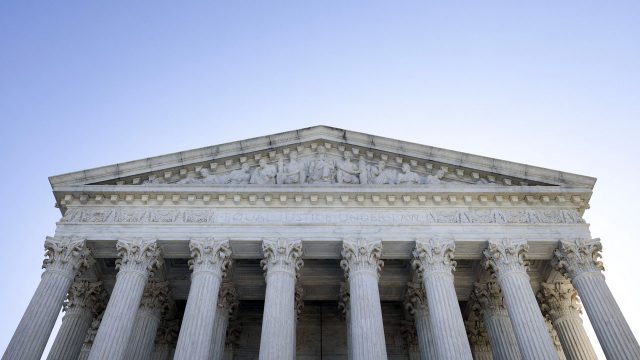By Editor
WASHINGTON, DC – SEPTEMBER 02: The U.S. Supreme Court is seen on September 02, 2021 in Washington, DC. The Supreme Court voted 5-4 not to stop a Texas law that prohibits most abortions after six weeks of pregnancy. Kevin Dietsch/Getty Images/AFP (Photo by Kevin Dietsch / GETTY IMAGES NORTH AMERICA / Getty Images via AFP)
Sir: Congratulations to President Biden’s nominee, Judge Ketanji Brown Jackson, a federal judge on the United States Court of Appeals for the District of Columbia Circuit, since June 2021. From 2013 until 2021, she served as a United States district judge. Furthermore, she served as a vice-chair and commissioner, on the United States Sentencing Commission until December 2014. Judge Jackson is currently a member of the Judicial Conference Committee on Defender Services, as well as on the Board of Overseers of Harvard University and the Council of the American Law Institute. She also currently serves on the United States Supreme Court Fellows Commission.The argument has been vociferously advanced against limiting the appointment of the next U.S. Supreme Court justice, to a qualified pool of black women, since they comprise about seven per cent of the population.
This is my response: Every black woman is also part of the majority of Americans –women are 50.8 per cent of the U.S. population, and women had zero representation on the Supreme Court until Sandra Day O’Connor was appointed in 1981. Prior to which, there had been 192 years of men only, on the highest court in the land since 1789. There was no similar argument put forward about what a small group Clarence Thomas, a black male, represented; when he was nominated to the Supreme Court in 1991. At the time, he only represented six-and-a half per cent of the U.S. population. The seven per cent along with other members of the black race, shouldered an outsized, inordinate, gargantuan, burden of human, societal and national development, in the U.S. for centuries – in chains, and other subhuman conditions (too many to enumerate). Suffice it to say, the black race was considered to be three-fifth human; this status-quo-ante was codified and settled law. The ‘Three-Fifths Compromise,’ was an agreement reached during the 1787 United States Constitutional Convention, over the counting of slaves in determining a state’s total population. The institutional injustices, inequities and deep-festering injuries – many fatal, most if not all; severely damaging to the minds, bodies and spirits, of members of the black race, continue to this present day. This situation is compounded by the fact that the United States Department of Homeland Security has identified white supremacy, and concomitant domestic terrorism, as the foremost threat confronting the nation. I write in the wake of over 20 bomb threats made to Historically Black Colleges and Universities nationwide. The black race in 2022 is still bearing an outsized, hellish burden, of U.S. national development and societal cohesion. In conclusion, I am supremely confident, that Judge Ketanji Brown Jackson is eminently qualified to be elevated to the position of a Supreme Court Justice, and that she will do the nation proud. Enough with the ‘seven per cent’ remonstrators. The outrage is unreasonable, uncharitable and unbecoming. Irene Fowler, an international lawyer, writer and poet.

